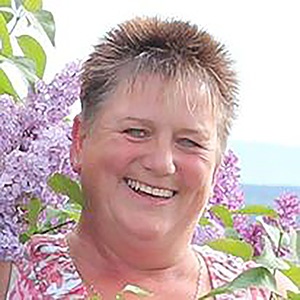Cindy Dettling, School District 60 of British Columbia
School BUSRide spoke with Cindy Dettling, transportation supervisor for School District 60 in Fort St. John, British Columbia, Canada. She offered her insights on how road maintenance affects pupil transportation, and about what her NAPT membership means for her professional development.
 Please introduce yourself and tell us about your district.
Please introduce yourself and tell us about your district.
My name is Cindy Dettling, I am the transportation supervisor for School District 60, which is located in Fort St. John, British Columbia, in the northeastern part of the province.
We are totally a rural bus service that brings the students from our rural communities into Fort St. John. We transport approximately 2,200 students every day and we have 43 bus routes.
What is the most pressing challenge for your district’s transportation department?
Road maintenance. Out of 43 bus routes, we probably have two that are entirely on pavement. The rest of them are maybe partially on pavement. Most of them are on gravel roads. Quite frankly, if some of our roads and hills were located in the southern portion of the province where it is more populated, they would not accept it. We have hills with slides and barriers and great big holes, and we have to transport students through there in spring, summer, fall and winter. It is really hard on the buses, it is hard when you have to maintain a schedule, but you have to maintain the buses and try to keep them in working order.
How are you seeking to solve this challenge?
It is a difficult issue to address. I am in contact with the road maintenance company on a regular basis. We participate in surveys twice a year, stakeholders’ surveys that we are invited to provide our input. The Ministry of Transportation is involved in the stakeholder assessment. They are the ones who invite us to participate. But again, we are not very populated up here compared to the south part of the province, so I have not seen much success. I know they are understaffed, the same as everybody else is, so it is difficult all around. I try to be as vocal as I can about it to whoever will listen, but I’m not always successful.
Why is certification important to you and what does it mean for your professional development?
I did that because I think education is very important, and that anything that we can do to help enhance our knowledge might make our job better. We can provide more information to our employees. Maybe there are different insights that we can provide. I think any education you can get is a benefit.
As a seasoned professional, what advice can you offer other NAPT members?
The best advice that I could offer is to stay strong. You need to have a thick skin in this business, both with the parents and students. There are a lot of negative calls that come in on a daily basis and we really cannot let it get to us or take it home. When we go home, that should be our time with our families. I am not saying it is easy, but I think it is a necessary skill that we have to have. Unless an emergency arises where you are absolutely needed, we really need to learn to leave work at work.
You are going to function better at work if you have time away from it. I am the worst person because I used to basically live, work, breathe…work. I wanted so badly to do it right and do a good job that I was getting really, really tired. You are not doing anybody any good if you cannot function. It is really important to take time for yourself and to step away.
What can the NAPT organization do to best help you?
I really appreciate the training they provide. To start with, I was finding it a little harder to find places to do the training, but there are increasingly more online courses available and when you are located in a more rural area, like I am, that is really important. We do attend conferences where we can pick up courses, but I really appreciate the ability to go online. I gather lots of information from there and listening to other people in the business. Even in the magazine, reading the articles in there, you pick up something that you didn’t know you needed.


